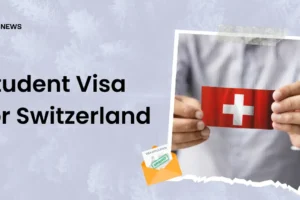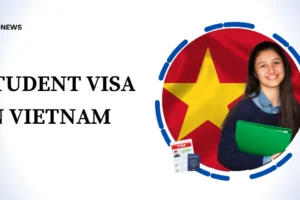Are you looking for Spain Student Visa, then you are on the right place. Spain is a preferred study destination among many international students. Along with hosting some of the best universities for international students, Spain also offers convenient climatic conditions and comfortable living standards for students.
Table of Contents
There are about 89 higher education universities in Spain, of which 50 are public and 39 are private.
Spain is home to a vast number of universities, many of which are highly regarded worldwide and consistently rank well. The trend indicates that more degree are being offered in English, even though the majority of Spanish universities priorities teaching in Spanish.
In this blog, we have curated information related to Spain student visas, which students can refer to to understand the process in detail.
Key Takeaways:
- Students who are engaged in doctorate activities, training activities, etc., require a Spanish student visa.
- Mostly, students from the EU member states do not require a Spain student visa.
- There are three types of Spain student visas: Schengen student visa, short-term student visa, and long-term student visa.
- During application, students are required to provide various documents such as application forms, photographs, and passport-size photographs, among many others.
- The application process for a Spain student visa is quite simple and can be done online or over the phone.
- The cost of the Spain student visa varies from 80 to 100 Euros.
- Students can work while they study in Spain. However, students are required to fulfil certain regulations.
- There are various universities in Spain for international students, such as the University of Barcelona and the University of Navarra.
What are the activities for which a Spain student visa is required?
Student visas can be obtained by people for the following purposes:
- Full-time studies at an authorised and recognised school which will result in a degree or certificate.
- Doctorate studies
- Training activities
- Student mobility programs at a compulsory or non-compulsory secondary education level from an officially recognised centre.
- Training placements at public and private bodies cannot be covered by internship visas.
- Volunteer services in the framework of programs pursuing public interest goals
- Au Pair programs.
- Teaching assistants.
Why should you apply for a Spain student visa?
Spain is considered to be one of the ideal places to receive quality education. It houses some of the top-ranked colleges and universities with a huge range of course options for international students.
Non-EU students who wish to pursue higher education in Spain should apply for a Spanish student visa. They can apply for a visa only after they receive a confirmation letter from a Spain university. There are two types of Spanish student visas:
- Type C or short-term visa, which is for 90 to 180 days.
- Type D or long-term visa, which is for more than 180 days.
Who can apply for a Spain student visa?
Likely, you won’t require a visa to study in Spain if you are a citizen of one of the European Union’s member states. Rather, they can simply relocate to Spain, establish themselves here, finish the necessary formalities, and begin their studies.
You can begin applying, though, if a visa is required for you to study in Spain. However, there are a few things you need to figure out before you begin the actual operations.
Remember that it’s important to apply for the appropriate visa at the appropriate time and location.
Types of Spain student visa:
Once a student receives an acceptance letter for their studies in Spain for research or academic activities, they can start applying for their Spain student visa.
There are three types of student visas in Spain. They are:
- Schengen Student Visa
- Short-Term Student Visa
- Long-Term Student Visa
The validity of your student visa depends upon the length of your studies, as it is implied that you are enrolled in a Spanish university.
1. Schengen student visa:
You need to apply for a Schengen visa if you’re not from the EU, EEA, or Schengen and you wish to study or conduct research in Spain.
You can stay in the nation for up to 90 days within 180 days using this document. In addition, you are allowed to travel freely within the 26 Schengen nations. You are not permitted to apply for a residence card with this kind of visa.
If you stay longer than the amount of time specified on your visa, you may be subject to legal repercussions, so be careful to keep track of the days you spend there.
Usually, this kind of visa cannot be extended. You would have to apply for a long-stay study visa after returning home.
2. Short-term student visa:
You can study in Spain for up to 180 days if you have a short-term student visa.
The Short Term Student Visa does not grant you the ability to apply for a Spanish resident card, just like the Schengen visa does.
3. Long-term student visa:
This kind of visa, as its name implies, allows you to study in Spain for more than six months.
With the long-term student visa, in contrast to the other two choices, you must apply for a TIE card (Tarjeta de Identidad de Extranjaro) no later than 30 days after arriving in Spain.
Spain study visa Vs Schengen Visa: Which visa do you need?
During the application process, applicants frequently have questions about the appropriate type of visa. This section is undoubtedly meant to clear that ambiguity.
Applicants don’t need to apply for a student visa if they are travelling to Spain for less than ninety days to study, train, intern, or perform voluntary work. Depending on the country of origin of the applicant, a short-stay visa can be necessary.
However, if the visitor plans to remain for more than ninety days, they must apply for a student visa in Spain.
What are the documents required for a Spain student visa?
1. Application form:
A visa application must be filled out completely, signed by the applicant, and returned. The application must be signed by one of the applicant’s parents or a legally recognised representative if the applicant is a minor.
2. Photograph:
A current colour passport-size photo, shot in front of a light background, without any dark or reflecting glasses on, and without any clothing covering the oval of the face.
3. A passport that has not expired:
The passport needs to have two blank pages and be valid for the whole length of the intended stay. More than ten years’ worth of passports will not be accepted.
4. Photocopies:
a photocopy of the page or pages in the passport bearing the migration stamp, past international visas, and biometric information.
5. Evidence of enrollment:
Evidence of enrollment in the course, training, internship, volunteer work, or volunteer work. It must include the program’s beginning and ending dates as well as the overall cost:
- Acceptance to a full-time study program at an educational facility with authorisation.
- Acceptance in a training or research facility.
- Acceptance into a student mobility program. However, in this scenario, the applicant additionally needs to show proof of acceptance to a study centre, that they have secured housing with a family or at a facility, and that the program organisers have agreed to cover the fees.
- Acceptance for an unpaid internship based on a written contract.
- A contract with the group in charge of the volunteer project.
6. Evidence of financial capability:
Original documentation demonstrating the applicant’s ability to pay for the student’s stay and return as well as the stay and return of any accompanying family members.
One hundred per cent of Spain’s Public Multiple Effects Income Indicator (IPREM) is the minimum requirement. 75% of the IPREM for the first family member and 50% of the IPREM for each additional family member must be added to this sum.
This sum will be subtracted if documentation demonstrates that the lodging for the duration of the visit has been paid for in advance.
- Sponsor’s signed letter of sponsorship.
- A copy of the sponsor’s passport, if available.
- The sponsor’s PAN card.
- original bank records of the sponsor.
7. Health insurance:
Both the original and a copy of the accreditation certificate from an insurance company licensed to conduct business in Spain for public or private health insurance. Every danger that Spain’s public health system insures must be covered by the insurance policy.
In addition to health insurance, the applicant needs to submit a copy of the organisation’s civil liability insurance policy if they are involved in a volunteer program.
8. Criminal record certificate:
When applying for a visa for a stay longer than 180 days, individuals of legal age must provide both the original and a copy of any criminal record check certificates that have been granted by their country or countries of residency within the previous five years.
The document has a six-month validity term. Where necessary, foreign documents need to be apostilled or legalised.
9. Medical certificate:
Following the International Health Regulations, applicants who need a visa for a stay longer than 180 days must present both the original and a copy of a medical certificate attesting to the fact that they do not have any conditions that could have a major negative impact on public health.
A licensed medical professional is required to issue the medical certificate. The document has a six-month validity term. The Ministry of External Affairs must apostil it.
What is the application process for a Spain student visa?
You can arrange a visa interview in one of two ways, depending on how the Spanish authorities in your home country have organised appointments:
- Online via the consulate’s website or a third-party visa centre.
- Over the phone.
On the day of the interview, you will have three tasks to finish:
1. Provide your biometrics:
Should this be your first trip to a Schengen area during the previous five years, you will be required to provide your biometric information. This implies that your fingerprints and face image will be taken.
2. Show up for the interview:
Ten to twenty minutes will pass throughout the interview. You will be questioned by a visa consular about your application, your past, and your plans to visit Spain. Along with providing the necessary documentation, you must respond to any inquiries about it.
3. Cover the cost of the visa:
The majority of the time, the visa fee must be paid during the interview or right before you see the consular representative. In certain cases, though, you will have to pay the charge online or at the bank before the day of your appointment.
You will have to wait for the processing of your visa after completing these steps. The processing of your application typically takes one month. You are free to visit Spain after obtaining the necessary visa.
What documents are required from family members?
Please submit the following forms for each family member who is going to be accompanying the student:
- The documents mentioned above.
- Certificates of marriage, single couple certificates, or birth certificates, as appropriate, attesting to the student’s kinship must be shown. Foreign documents need to be certified or apostilled, and if necessary, they need to be provided with an official Spanish translation.
- The Consular Office may ask for further information or documentation to evaluate the application, as well as a personal interview if needed.
What is the validity of a Spain student visa?
You are not allowed to stay in Spain for more than 180 days if you are granted a Long-Stay Student Visa.
However, if your Spain student visa does not specify this kind of restriction, you will need to obtain a one-year Foreigner Identity Card. As long as you keep up your studies, you can renew it five times.
What is the cost of a Spain student visa?
A Spain student visa can cost from 80 to 100 euros. The Spanish Embassy could change the visa fees for many reasons. Students are advised to check the cost on the embassy website before applying for the visa.
The amount of money you need to pay depends on your nationality, as given below:
- USA citizens will need to pay a fee of €141 to get a Student Visa for Spain.
- Canadian citizens have to pay a fee of €83
- Applicants of other nationalities have to pay a fee of only €80.
Processing time for Spain student visa:
The Spanish visa procedure can take two to six months. Provide all required documentation when applying for a student visa. Process time for a visa is reduced if all supporting documentation is submitted on time.
Can students in Spain work while studying?
Non-EU students are permitted to work part-time during the school year and full-time during the summer.
For non-EU/EEA students to work in Spain, they must fulfil the following requirements:
- Make a work permit application. The employer should do this.
- Maintain a backup income stream; the revenue from your part-time job should only be supplementary.
- Keep in mind that you are only allowed to work a full-time job for three months at a time, not during the academic year when you should be studying.
| Higher study options | Part-time work duration allowed | Post-study work permit | Can departments work full-time? | Is schooling free for department children? | PR option available for post-study and work |
| Bachelors | 30 hours every week | 12 months | No | No | No |
| Masters (MS/MBA) | 30 hours every week | 12 months | No | No | No |
What are the language requirements to study in Spain?
Even if classes taught in English are available to international students, learning Spanish has advantages. Entrance to the nation’s universities does not require proficiency in Spanish.
Nonetheless, the majority of colleges offering Spanish courses demand that candidates pass a test in Spanish as well as have a strong command of the language. The Diploma de Español Como Lengua Extranjera, or DELE test, is the most recognised Spanish language exam.
If you have chosen to enrol in an English course, you will need to prove your language skills by passing the Cambridge Advanced or IELTS exams.
Top universities in Spain for International students:
There are many universities in Spain for International students that impart quality education to students. Some of the cheapest universities in Spain for international students include public universities making it ideal for most students who wish to study at a low budget. The most popular universities in Spain for international students are:
| University | Spain Rank 2024 | QS Ranking 2024 |
| University of Barcelona | 1 | =152 |
| Autonomous University of Barcelona | =2 | 201–250 |
| Pompeu Fabra University | =2 | 201–250 |
| University of Navarra | 4 | 301–350 |
| Autonomous University of Madrid | 5 | 351–400 |
| Complutense University of Madrid | =6 | 501–600 |
| University of Granada | =6 | 501–600 |
| Rovira i Virgili University | =6 | 501–600 |
| University of Valencia | =6 | 501–600 |
What is the cost of studying in Spain?
Study expenses vary depending on the course and college you choose. The tuition at public institutions in Spain is lower than that of private universities in the country.
Public Universities:
| Level | Fees (in Euros) |
| Bachelor’s | 750-4,500 |
| Master’s | 1,000-5,500 |
Private Universities:
| Type | Fees (in Euros) |
| Private Universities | 20,000 – 30,000 |
| Business Institutes | 25,000 – 35,000 |
| MBA | 30,000 – 40,000 |
Top courses to choose from in Spain:
The ideal location for overseas students to study in Spain. There are 86 universities in the nation, 29 of which are private. Graduate, postgraduate, master’s, and specialized courses are offered by Spanish universities. Students have an extensive selection of specializations at the degree level.
Popular courses available for selection in Spain:
- STEM (Science, Technology, Engineering, Mathematics)
- Law
- Computer Science
- Spanish language
Scholarships in Spain:
| Name of the Scholarship | Amount (Per Year) |
| The Spanish Agency for International Development Cooperation (AECID) scholarship | Up to 30,000 Euros |
| Erasmus Mundus Scholarship | Up to 16,800 |
| CIEE Scholarships and Grants | Up to 6,000 |
| La Caixa Foundation Scholarships | Up to 600 Euros |
| EADA Scholarships | Up to 15,000 Euroa |
What to do if my Spain student visa is rejected?
The denial of your Spanish visa is subject to appeal. Include your name, email address, and passport number on the application form that you can fill out at the agency or the Embassy. Describe your thoughts on why you believe the visa should have been approved. The Embassy will either approve or deny the visa application after reviewing the appeal.
Frequently Asked Questions:
1. How can I get a student visa for Spain?
Apply for a visa far enough in advance of when you want to begin your education. Six months before the planned departure date or the start of the study program, you can apply for a study visa.
2. How much money is needed for a Spain student visa?
To be eligible for public benefits and immigration, non-EU/EEA citizens applying for student visas must have at least 100% of the minimum income indicator used in Spain (IPREM). The national budget reviews this every year, and in 2024 it is set at €600 per month.
3. How much bank balance is required for a Spain student visa?
The Spanish government has granted permission for the educational institution to issue student visas for Spain. evidence of financial capability. You’ll have to provide proof that you study for at least €600 a month.
4. Is IELTS needed for a Spain student visa?
International students are favoring Spain student visas due to the lack of an IELTS requirement and the abundance of master’s and doctoral grant opportunities.
5. Can I work in Spain with a student visa?
While studying in Spain, international students with a student visa can work and supplement their income. With a student visa, you can work up to 20 hours per week in part-time employment while you are studying in Spain.
Conclusion:
Spanish institutions are incredibly friendly and open, and they have a ton of student activities all year long that provide chances to get to know other international students from all over the world, visit the city and experience the local culture.
International students who choose to study in Spain come from all over the world, however most are from Europe or America. This implies that forming lifelong friendships with individuals from diverse cultural origins should not be difficult.
Moreover, the visa application for Spain student visa is easy and quick hence making it quite feasible for most international students.












Add Comment